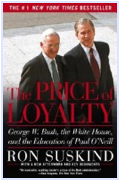
“The aide said that guys like me were ‘in what we call the reality-based community,’ which he defined as people who ‘believe that solutions emerge from your judicious study of discernible reality.’ I nodded and murmured something about enlightenment principles and empiricism. He cut me off. ‘That’s not the way the world really works anymore,’ he continued. ‘We’re an empire now, and when we act, we create our own reality. And while you’re studying that reality – judiciously, as you will – we’ll act again, creating other new realities, which you can study too, and that’s how things will sort out. We’re history’s actors . . . and you, all of you, will be left to just study what we do.'”
-Ron Suskind, former Wall Street Journal reporter and author of The Price of Loyalty: George W. Bush, the White House, and the Education of Paul O’Neill.




The guy’s name was Ozymandias, actually. http://www.bartleby.com/106/246.html Reading Leo Strauss or Harvey Mansfield would give you the intellectual background on this kind of neocon hubris. The provenance of these attitudes is not that of our founding fathers, not that of the Enlightenement, not that of British liberalism and empiricism, but that of Plato, Machiavelli, Nietzsche, Strauss, and Carl Schmidt, the leading jurist in Nazi Germany. The strong leader has audacity; he creates the world in which others must labor. His greatest instrument is war. Among the instruments of war is the demonization of enemies and the rule of a populace by the noble lie. The ruler is above the law by law. He declares the state of exception that renders his power in a time of terror absolute. He saves the Constitution by suspending it (Schmidt). These views may seem preposterous but they form an intellectual tradition and that tradition animates certain world historical opportunists with excellent educations.